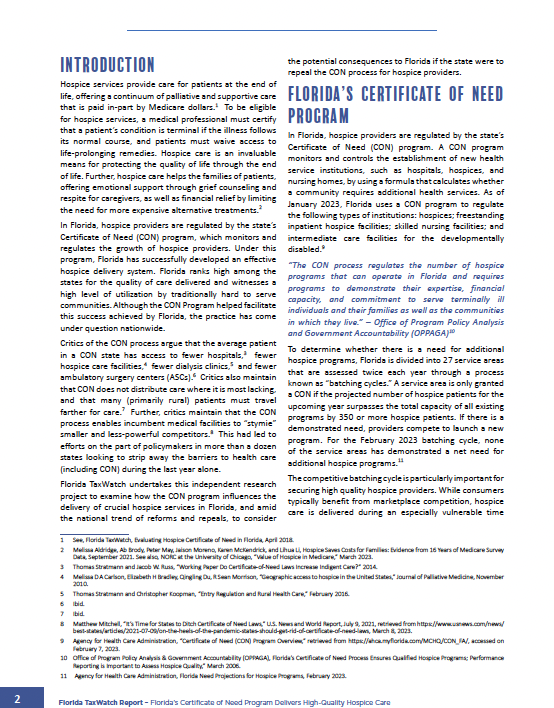Florida's Certificate of Need Program Delivers High Quality Hospice Care
 Although a relatively low number of providers provide for this number of patients, the quality of hospice services in Florida surpasses the quality demonstrated in many other states. The U.S. Centers for Medicare and Medicaid Services measures the overall quality of hospice care with two indicators --- the Hospice and Palliative Care Composite Process Measure and the Hospice Care Index Overall Score. Compared to other states, Florida’s performance measured by the Hospice and Palliative Care Composite Process Measure ranks 6th and its score for the Hospice Care Index Overall Score is tied for 3rd.
Although a relatively low number of providers provide for this number of patients, the quality of hospice services in Florida surpasses the quality demonstrated in many other states. The U.S. Centers for Medicare and Medicaid Services measures the overall quality of hospice care with two indicators --- the Hospice and Palliative Care Composite Process Measure and the Hospice Care Index Overall Score. Compared to other states, Florida’s performance measured by the Hospice and Palliative Care Composite Process Measure ranks 6th and its score for the Hospice Care Index Overall Score is tied for 3rd.
In the absence of CON regulations, states have demonstrated prolific growth of hospice providers. The more hospice providers a state has, the harder it becomes to monitor for quality and safeguard against fraud. A large number of providers also makes the state more susceptible to fraud since there is only a limited number of eligible hospice patients. California effectively illustrates the risks of amending or repealing a hospice CON program. California has more than one thousand hospice providers, and state auditors found that the state is likely experiencing large-scale hospice fraud. Hospice fraud threatens the safety of California’s residents and wastes taxpayer dollars. The California Attorney General estimates that in Los Angeles County alone, hospice agencies overbilled Medicare by $105 million and the state’s Medi-Cal by $3.1 million in 2019.
Florida’s hospice delivery system works. The Certificate of Need Program has intentionally planned and developed a network of high-quality, readily available hospice providers. Florida TaxWatch recommends the CON program be retained in statute, and that hospice regulators continue to identify ways that Florida hospice providers can continue to provide high quality care for Floridians.